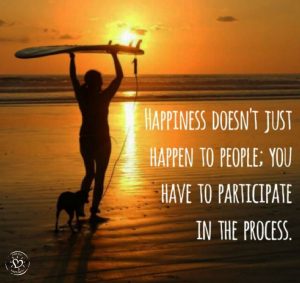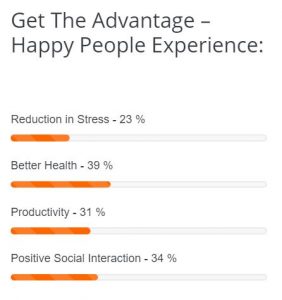How Happiness and Gratitude Affect Your Life
According to Meriam Webster, happiness is a state of well-being and contentment or a pleasurable or satisfying experience. Or as Gandhi said, “Happiness is when what you think, what you say, and what you do are in harmony.” Plenty of recent studies have concluded that adopting a happy or positive outlook in all aspects of your life can act as a magnet and attract positive situations, relationships and experiences to you.
Shawn Achor is one of the world’s leading experts in happiness. Shawn spent 12 years at Harvard University formally studying how happiness and success connect. He’s given a TED talk with 14,997,348 views. He’s also written two New York Times best-selling books, The Happiness Advantage (2010) and Before Happiness (2013). He’s even been on Oprah! His Happiness Challenge is a great way to start practicing happiness little by little. Here’s a PDF that is available for download.
Inc Magazine has a very comprehensive article on the topic that outlines five key takeaways from Shawn Achor’s Ted Talk. The New York Times even has a recent piece about how the impact of positive thinking “can improve health and extend life.”
So why does happiness play a huge role in our lives?
Well, happiness is what we all strive for, right? It’s even in our Constitution as a human right. The problem is, if you’re always striving for it, you never experience it in the present. Practice mindfulness about your current situation and think about the current things and people in your life who make you happy. Instead of constantly striving for it, be happy NOW. Practice gratitude every day for what you DO have and your accomplishments. Even think about the little things such as the feeling of the sun on your face, the smell of hot coffee, cuddling with your family or pets, your good health, a phone call from an old friend. And don’t forget about practicing self-love! Pat yourself on the back and treat yourself every now and then. You deserve it. After all, who doesn’t want good health, heightened productivity and an extended life?
Happiness and positivity are a mindset, a choice. Choose to be happy instead of focusing on the negative. Don’t sabotage yourself before anything even happens. Believe in positive energy and thoughts and they will come your way. And remember, always act in accordance with your values and your goals to set yourself up for success. Here is a lovely journal to help you write out what makes you happy and help you set yourself up for future happiness.
For a comprehensive deep dive on the subject, and just for general knowledge on wellbeing, read the Dalai Lama and Howard Cutler’s best-selling book, The Art of Happiness. A review on Goodreads by Alice McCain reads, “Would it be an exaggeration to say this book saved my life? Not really. When I was at my lowest, it was this book that I kept by my side, in my bag, and next to my bed, near me at all times. My copy is dog-eared, marked up and flagged in more places that I can count. In this treasure, we learn how to reshape our mental outlook so that we can live easier in this world.”
Below are several percentages of the mental and physical advantages of happy people:
 Looks and sounds great, right? Well, how do you practice being happy and positive? We’ve got a plan of action for you:
Looks and sounds great, right? Well, how do you practice being happy and positive? We’ve got a plan of action for you:
HAPPINESS PLAN OF ACTION
- Happiness mindset: write out what makes you happy.
- Determine how you’re going to create more happiness opportunities, even if it’s a “small step.”
- Need a boost? Try The Happiness Advantage Action Plan Guide by Shawn Achor.
- Consider happiness training with a Google application: Happify.
You have control over how you want to feel!
A huge component of happiness is gratitude. Gratitude is being appreciative of benefits received and the state of being grateful or thankfulness.
Artist Lori Portka painted her gratitude for over a year for 100 people. How will your gratitude show?
As beautiful and inspiring as Lori’s story is, we don’t all have time or talent to paint for every person who has made a positive difference in our lives. However, it’s so very important to let the people in your life know how much you appreciate them. Shawn Achor discusses the effects of kindness on the brain. Guess what? It makes you happier. So call your mom and tell her how much you appreciate her, send an email to an employee to say “good job,” or buy a stranger lunch or a cup of coffee. Practicing kindness and paying it forward increases happiness for you and others. Try one act of kindness every day and see what happens.
A tangible way to practice gratitude is by daily journaling. Oprah has been discussing the benefits of journaling about gratitude for over a decade. Recently, Jeff Vrabel, in an article for Success magazine, discusses the benefits of journaling about gratitude and what he learned from keeping one. He also gives glimpses of his own personal journal and confers how he settled into a routine. In the article, Vrabel quotes Blaire Morgan, PhD, a research fellow at the University of Birmingham in England: “Our own research has demonstrated a strong link between gratitude and three different measures of well-being: satisfaction with life, subjective happiness and positive affect.” By writing down what and who you are grateful for, your mind takes a mental picture of the things and people you DO have and thus, you’re more satisfied. Here is a fantastic gratitude journal we found to help you out. And here is a podcast also from Success Magazine about the power of gratitude.
If journaling sounds strange or hard to you, The University of California at Berkeley offers these journal tips:
- Journal 15 minutes per day, at least once per week for at least two weeks.
- Be as specific and in depth vs. broad.
- Think about the people you’re grateful for vs. things.
- Consider how you might be grateful for things that didn’t happen.
- Think about what a gift good things are and describe them.
- If you’re low on creativity, think about a different aspect of the same gift.
Again, here is a gratitude plan of action for those in need:
- What can you celebrate with saying thank you?
- Write what you’re thankful for at least three times a week.
- If you’re not a writer, find a creative way to express your gratitude.
- Remember to thank those you live and work with words, acts of kindness
- or gifts.
Lastly, remember:

